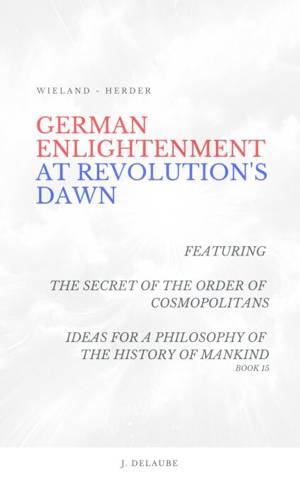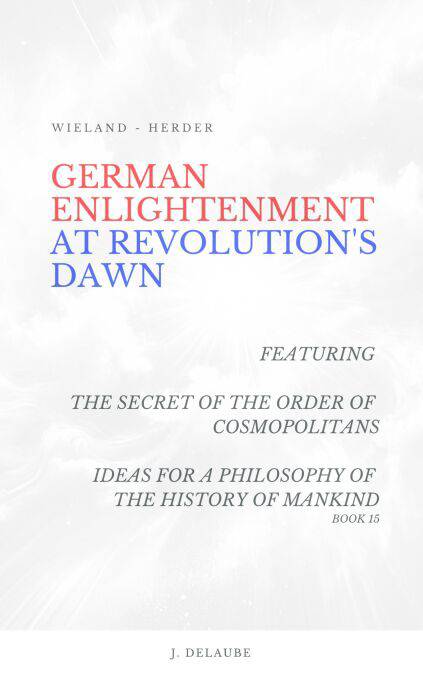
Bedankt voor het vertrouwen het afgelopen jaar! Om jou te bedanken bieden we GRATIS verzending (in België) aan op alles gedurende de hele maand januari.
- Afhalen na 1 uur in een winkel met voorraad
- In januari gratis thuislevering in België
- Ruim aanbod met 7 miljoen producten
Bedankt voor het vertrouwen het afgelopen jaar! Om jou te bedanken bieden we GRATIS verzending (in België) aan op alles gedurende de hele maand januari.
- Afhalen na 1 uur in een winkel met voorraad
- In januari gratis thuislevering in België
- Ruim aanbod met 7 miljoen producten
Zoeken
German Enlightenment at Revolution's Dawn E-BOOK
Featuring "The Secret of the Order of Cosmopolitans", "Ideas for a Philosophy of the History of Mankind, Book 15"
Johann Gottfried Herder, Christoph Martin Wieland
E-book | Engels
€ 0,99
€ 4,49
Omschrijving
Two groundbreaking texts from the German Enlightenment—one written on the eve of the French Revolution, the other during its early years—available in modern English translation for the first time.
Christoph Martin Wieland's "The Secret of the Order of Cosmopolitans" (1788) offers a fascinating exploration of secret societies and moral dilemmas on the precipice of revolutionary change. "Such an oath creates a state within a state," warns Wieland, a prominent Freemason, as he examines the shadowy world of Illuminati and cosmopolitan ideals just before the old order would collapse.
Johann Gottfried Herder's "Ideas for a Philosophy of the History of Mankind" presents a comprehensive theory of human development written as the revolution unfolded. "Rome disturbed the balance of the world, and under its sway, a world bled. What new order will rise from this upheaval?" Herder asks, developing a philosophy of progress that remains surprisingly relevant today.
Together, these works provide an intimate window into German intellectual life during one of history's most pivotal moments—revealing how Enlightenment thinkers grappled with questions of governance, progress, and human nature as the world transformed around them.
Both texts are thoroughly annotated by editor Jean Delaube, providing essential context and insights for modern readers.
Christoph Martin Wieland's "The Secret of the Order of Cosmopolitans" (1788) offers a fascinating exploration of secret societies and moral dilemmas on the precipice of revolutionary change. "Such an oath creates a state within a state," warns Wieland, a prominent Freemason, as he examines the shadowy world of Illuminati and cosmopolitan ideals just before the old order would collapse.
Johann Gottfried Herder's "Ideas for a Philosophy of the History of Mankind" presents a comprehensive theory of human development written as the revolution unfolded. "Rome disturbed the balance of the world, and under its sway, a world bled. What new order will rise from this upheaval?" Herder asks, developing a philosophy of progress that remains surprisingly relevant today.
Together, these works provide an intimate window into German intellectual life during one of history's most pivotal moments—revealing how Enlightenment thinkers grappled with questions of governance, progress, and human nature as the world transformed around them.
Both texts are thoroughly annotated by editor Jean Delaube, providing essential context and insights for modern readers.
Specificaties
Betrokkenen
- Auteur(s):
- Uitgeverij:
Inhoud
- Aantal bladzijden:
- 1
- Taal:
- Engels
Eigenschappen
- Productcode (EAN):
- 9783819054051
- Verschijningsdatum:
- 13/03/2025
- Uitvoering:
- E-book
- Formaat:
- ePub

Alleen bij Standaard Boekhandel
Beoordelingen
We publiceren alleen reviews die voldoen aan de voorwaarden voor reviews. Bekijk onze voorwaarden voor reviews.









